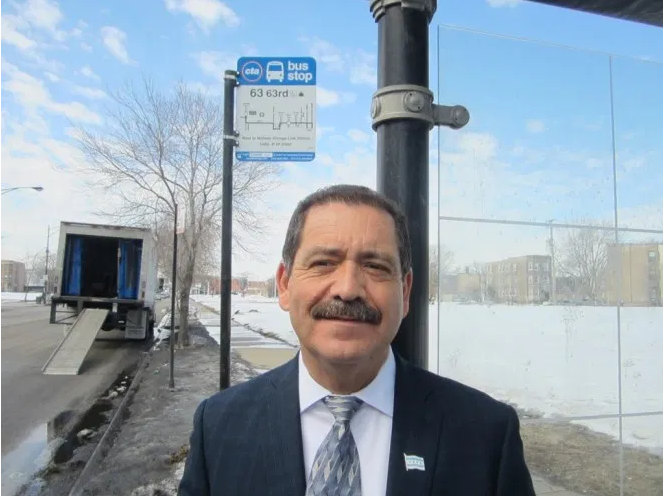Three progressive members of Congress are forming a new caucus that aims at nothing less than transforming how the federal government funds mass transit and supports its expansion through the 21st century.
House Democrats Ayanna Pressley (D-Mass.), Jesus Garcia (D-Ill.), and Mark Takano (D-Calif.) will launch the Future of Transportation Caucus on Thursday morning to examine how federal formulas allocate funds to highways and transit and promote a plethora of bills that tackle inequality, housing density, air pollution, and emerging transportation technologies.
"Our goal is to create vision for equity and access for sustainability of transportation policy," Garcia, a Chicago rep, told Streetsblog. "We’re not trying to build an interstate highway system like we did 60 years ago. Roads and bridges are in disrepair but marginalized communities like the one I represent are left out and funding can’t be the only solution of equation."
Pressley, of Boston, added that the current system for spending federal money on transit is "antiquated and contributing to the inequities and disparities when it comes to access to affordable, reliable, and rapid transit" according to WBZ NewsRadio.
The timing is right to begin raising attention among fellow members over transit funding before Congress gets serious about infrastructure funding and the expiration of the Surface Transportation bill looming in September 2020, House members said. It's also another forum for legislators to address address global warming beyond the Green New Deal amid climate demonstrators clamoring for global action and the Trump administration determination to roll back California's emissions standards.
"This moment is occurring in a heightened sense of the need to adapt to global climate change," Takano, whose district includes Riverside, told Streetsblog. "We need to look at combining our approach to transportation with how we build housing and we need to apply a lot of previous transportation planning ideas with a greater sense of urgency."
Interest in the caucus is beginning to pick up. As of Wednesday, the caucus currently counted 13 Democratic members including Oregon Rep. Earl Blumenauer, who co-chairs the Congressional Bike Caucus and vowed to straighten out the Trump administration's "incoherent" transportation policy.
Caucus leaders said did not have specific legislative proposals to promote, although there are several bills that have been introduced this year that could eventually gain broader support. California Rep. Scott Peters's measure to make federal transit funding contingent on housing development that would be built near the site of the project is drawing interest among caucus members.
"The proposal has three benefits — it gives taxpayers a better return on their money, gives commuters better options for getting around, and gives environmental advocates cleaner air because it will get people out of their cars," Peters told Streetsblog. "It's vital for us to do this."
Members however differ about the scope of the caucus on transit. Pressley floated to WBZ that Congress could take a role in reforming the beleaguered Massachusetts Bay Transportation Authority, although Garcia told Streetsblog he wouldn't use the caucus to wade into local transit disputes, such as the spat over a Chicago commuter rail proposal to lower fares and boost service along the South Side.
But it's likely that lawmakers will take many cues from policymakers and transit advocacy groups who are in support of the caucus's formation, including Transportation for America, which is advocating for Congress to stop spending money on new roads, the Eno Center for Transportation, whose new report argues Congress should value public safety and emissions reductions in any transit grants they give out, and the LivableStreets Alliance, whose executive director Stacy Thompson was on Capitol Hill for the launch.
Changing decades-old federal formulas to weigh more heavily toward transit is a serious challenge that requires political will which a dysfunctional Congress has yet to muster in the Trump era. A good start would be convincing skeptical car-dependent congress members to join the caucus.
There aren't any Republicans or senators of either party in the caucus yet, despite a demonstrated interest among members in privately funded boondoggles-in-waiting like hyperloops and autonomous vehicles. Five Republican Congress members attended a press conference on Wednesday with Virgin Hyperloop One to call for congressional support of the technology.
Garcia said caucus leaders are open to broadening their ranks. And he'll even listen to his colleagues gush about hyperloops.
"We wanted to be bipartisan and bicameral, that’s critical to success as we plow forward," Garcia said. "We intend on being a big tent. They can bring their ideas to the caucus and we’ll debate it."






